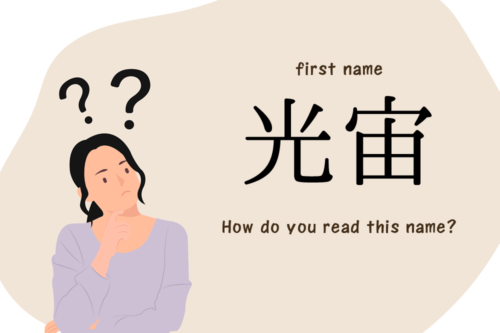Choosing a favorite baby name can feel intimacy and affectionate. When parents name their children, they put a lot of thoughts and consideration into it.
Share on your favorite
Or copy the link
Below are navigation links that will take you to the main text and navigation menus.
26,551 first names, 70,620 last names, 333,585 kanji variations.
one of the best Japanese name search tools for your baby!

I wrote about how creative you can be in choosing, or rather creating, a Japanese first name in my earlier article, and today I want to tell you how creative you can be in coming up with Japanese nicknames.
I know that there are many clever ways to come up with nicknames in the world, but I think that Japanese nicknaming is the most creative and fun! Here are some examples of how to do it.
Contents
This is simple and similar to the Western way.
It works like Dan for Daniel and Beth for Elizabeth. Nobuyuki (male) can become “Nobu” and Haruna (female) can become “Haru.”
There are so many female names that end with “-ko” (although the popularity is significantly dropping lately) and so very often the “-ko” is removed. For example, Kumiko is often affectionately shortened to “Kumi.”
The Japanese language is incredibly rich with suffixes, and there are a lot of different kinds of suffixes you can use for nicknaming, from cute ones to funny and strange ones.
And you can even create one on your own!
“-kun” is an honorific. It’s mainly used for boys and male friends, when addressing a male who is younger than you are or the same age as you are.
So often, Japanese suffixes are attached to the shortened given name. For example, Masato often becomes “Ma-kun” and Teruo can turn into “Teru-kun.”
“-chan” is a very endearing honorific. This is the female version of “-kun” and most frequently used for young girls and children but you can use “-chan” for men and adults as well.
Naoko (female) often goes by “Nao-chan” and Shinji (male) can become “Shin-chan.”
This is a very affectionate and cuter form of “-chan” used for cute babies and children, but it’s sometimes used for adults, too. Meiko (female) can become “Mei-tan” and Koichi (male) can become “Ko-tan.” Very sweet!
This is another cuter form of “-chan” that sounds sweet and funny.
Kaori (female) often becomes “Kao-rin” and Mako (female) can turn into “Mako-rin.”
For some mysterious reason, Mika (female) almost always turns into “Mika-rin.” I wonder why…?
Japanese people, both men and women, use their surname as a nickname much more often than the Westerners do.
It’s probably because surname is honored more in Japan than in the West. In Japan the surname is often shortened, too and a suffix is attached to it, like “Yama-chan” for Yamamoto. A lot of suffixes are used for surnames, including the above mentioned “-kun” and “-tan.”
Can you believe that many Japanese people combine a part of their surname and a part of their given name to create a nickname?
You almost never see this in the West. I think this is probably the most unique thing about nicknaming in Japan.
For example, the popular actor Kimura Takuya is affectionately called “Kimu-Taku” in Japan. (In Japanese the surname comes before the given name.)
And most of the men who are named Kato Kenji or Kato Kenichi go by “Kato-Ken” because it sounds so good. This combining method only works if it sounds good in Japanese.
Now, I hope you have some idea of how fun creating a Japanese nickname can be!
There are actually countless different ways to create Japanese nicknames, including playing on words which you’d need to speak the Japanese language to understand, so the rules of Japanese nicknaming I’ve introduced here are only a few examples among so many.





Sort by: Most Relevant
Sorts names by how closely they match your search meaning. Names containing more kanji that match your search terms appear higher in the results.
Sort by: Most Kanji Variations
Sorts names by how many different kanji spellings they have. In general, names with more variants tend to be more familiar and widespread in Japan (with some exceptions).
Sort by: Most Viewed
Sorts names by page views on this site. Views reflect global traffic (including Japan), so this does not represent popularity among Japanese people only. A high view count does not necessarily mean the name is famous in Japan.
What is Hiragana?
Hiragana is one of the two Japanese syllabaries. Each character represents a sound (mora), not a meaning. It is used for native words, grammatical particles, verb/adjective endings (okurigana), and to show pronunciation above kanji (furigana). It developed from cursive forms of kanji.
What is Katakana?
Katakana is one of the two Japanese syllabaries. Each character represents a sound (mora), not a meaning. It is mainly used to write foreign words and names, loanwords, onomatopoeia, and for emphasis.
What is a Kanji Idea?
Kanji are Chinese characters used in Japanese writing. Unlike katakana and hiragana, each kanji character carries its own meaning.
When we convert your name into kanji, we select characters whose sounds match the Japanese pronunciation of your name, while also considering the meaning of each character. The result is a unique combination of kanji that both sounds like your name and carries meaningful symbolism.
We refresh the kanji combination each time you visit, so you can discover different options. If you find one you like, save it to your favorites!
What are English Syllables?
A syllable is a unit of pronunciation in English — it’s the beat you hear when you say a word.
Here are a few quick examples:
cat = 1 syllable
ba-by = 2 syllables
beau-ti-ful = 3 syllables
On this site, English Syllables show how a name naturally breaks into sounds when spoken in English. This helps you understand how English speakers naturally say the name and where they pause between sounds.
What are Japanese Morae?
A mora (plural: morae, Japanese: 拍 Haku) is the basic unit of sound in Japanese — think of it as one rhythmic “beat” when speaking.
Here are a few quick examples:
あ (a) = 1 mora
あい (a-i) = 2 morae
きょう (kyo-u) = 2 morae
On this site, Japanese Morae show how many “beats” a name has in Japanese. Most Japanese names have about 2–4 morae, which affects how natural and rhythmic the name sounds to native speakers.
This helps you see how the name fits into the natural rhythm of Japanese speech.
What is English Transcription?
“English transcription” (romanization) is the romanized form of a Japanese name, intended to reproduce its pronunciation as closely as possible. It is also useful for searching names on this site.
Japanese-Style Nicknames
In Japan, nicknames are used to express familiarity and affection. Typical features include:
Shortened forms: Names are often shortened for closeness, e.g., “Yuki” from “Yukiko” or “Taka” from “Takashi”.
Suffixes: Terms like “-chan” (often for girls, also for young children) and “-kun” (often for boys) are used among family and close friends. Among very close adults, “-chan” may still be used. More details
Use & context: Nicknames are informal—common among friends, family, or close colleagues—and are not suitable for formal or professional settings. Their use implies a certain degree of intimacy.
Long vowels: The long vowel mark “chōonpu” (ー) extends the preceding vowel. For example, “あーちゃん” (A-chan) lengthens the “あ” sound.
Households
Sorts surnames by the estimated number of Japanese households that use them. More households generally indicates a more common or well-known surname.
About our last-name data

Success
Migration completed successfully!